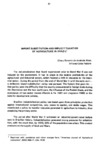Please use this identifier to cite or link to this item:
http://www.alice.cnptia.embrapa.br/alice/handle/doc/958555| Title: | Import substitution and implicit taxation of agriculture in Brazil. |
| Authors: | ALVES, E. R. de A.  PASTORE, A. C.   |
| Affiliation: | ELISEU ROBERTO DE ANDRADE ALVES, DE-PR. |
| Date Issued: | 1984 |
| Citation: | In: YEGANIANTZ, L. (Ed.). Brazilian agriculture and agricultural research. Brasília, DF: EMBRAPA-DDT, 1984. 307 p. (EMBRAPA-DEP. Documentos, 9). |
| Pages: | p. 61-73 |
| Description: | The industrialization that Brazil experienced prior to World War II was not induced by the government It had its origin in the relative profitability of the agricultura1 and industrial sectors, which favored a shift in resources to the indup trial sector. During the period from the end of World War II until the early sixties, a deliberate import-substitution policy was pursued. The factors that gave rise to that policy were the diff iculty that the country encountered in foreign trade during. the Depression and the two world wars, the influente of the Prebish thesis, and the dominance of two sector models (Rannis & Fei 1961 and Jorgenson 1969) as the basis for development policies. |
| Thesagro: | Agricultura Importação |
| NAL Thesaurus: | Brazil agriculture |
| Keywords: | Brasil Implicit Implicito Import Impostos Taxation |
| Type of Material: | Parte de livro |
| Access: | openAccess |
| Appears in Collections: | Capítulo em livro científico / Embrapa Unidades Centrais (AI-SEDE)  |
Files in This Item:
| File | Description | Size | Format | |
|---|---|---|---|---|
| Importsubstitution.pdf | 4,29 MB | Adobe PDF |  View/Open |









